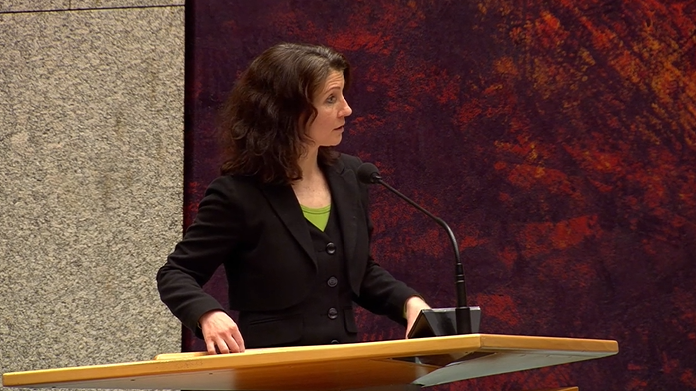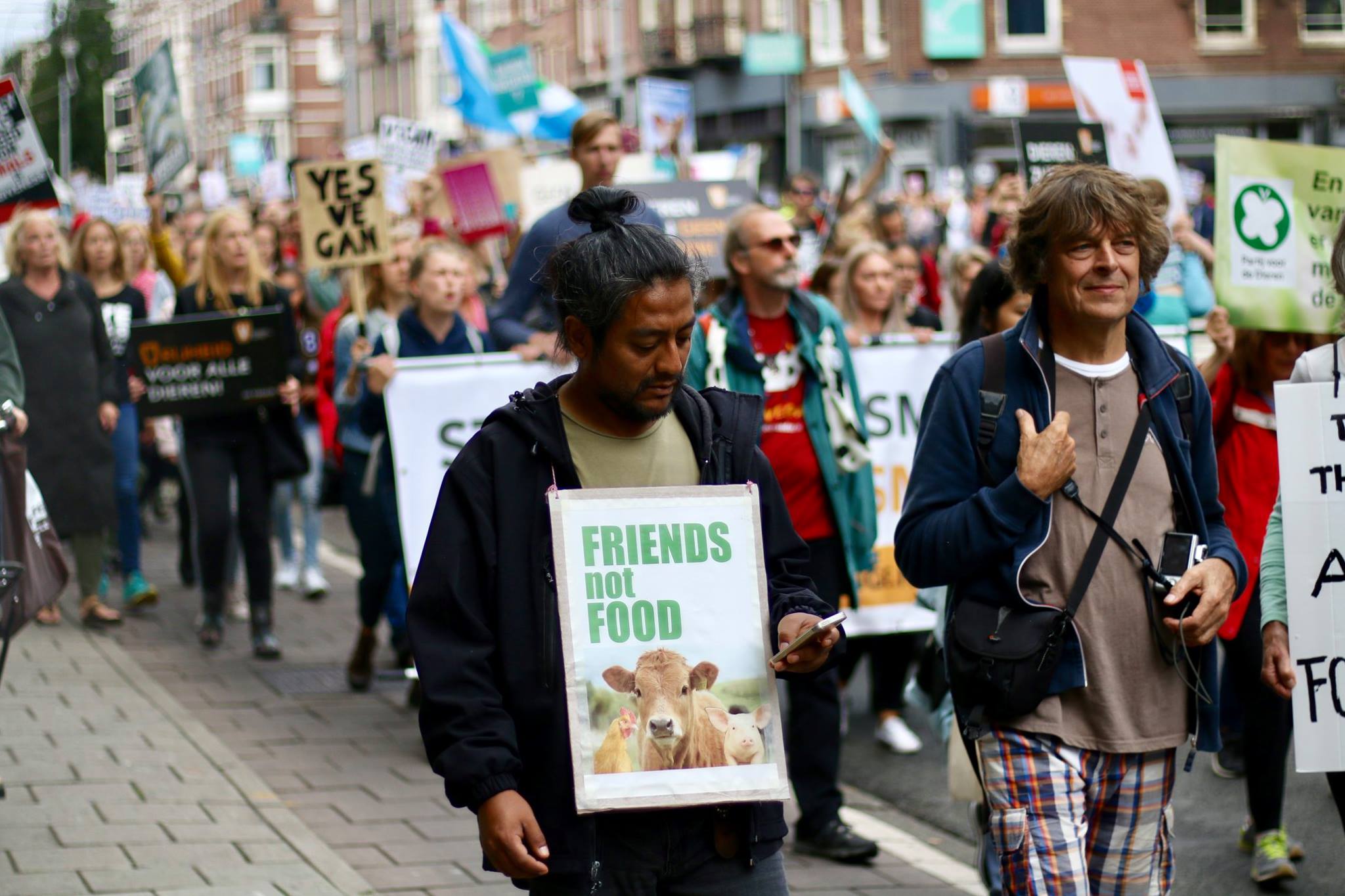Worldlog Esther Ouwehand
In my latest Worldlog of 2018, I announced that in the new year, the Dutch Lower House was going to have a fundamental debate on the suffering and dying of livestock animals. This debate took place two weeks ago, and last week the Lower House voted on the different motions the Party for the Animals had tabled in order to help the animals. We had asked our colleagues of other political parties in advance to show courage, to think about their responsibility for the fate of the over 64 million animals bred, used and killed in the Dutch livestock sector each year.
The debate was a historic one, as awareness in society is growing stronger every day. However, during the debate and subsequent votes, the politicians decided to stand on the wrong side of history once again. Confronted with the large-scale suffering of livestock animals on a daily basis, the majority of our fellow politicians did what they always do: deny and trivialise the facts, and demonise the messenger. Activists who had shown citizens what really goes on behind closed doors with animals, were dismissed as criminals; while it is these very activists who are trying to protect a key value of our democracy: the right to honest information. This right is under pressure as consumers are deceived by their government, supermarkets and the livestock sector: happy animals on brochures and packaging; exploited animals in the stables.

Esther Ouwehand during the debate on animal suffering in livestock sector
It is not the farmers, but the system that is under debate. A system in which people need to be constantly woken up by images of reality, and in which the supervisor fails in upholding the already weak rules. Undercover footage frequently shows pigs, social animals, trapped between bars, forced to watch their piglets being mutilated. Their tails are docked and their teeth clipped without the use of anaesthesia. Although our Minister of Agriculture denies that the practices shown in the images are representative of the sector, they are allowed by the Minister’s own law. The current rules allow for these horror practices.
Over 18 years ago, a majority of the political parties in the Netherlands made a promise that by 2022, the animal’s perspective would be a determining factor in the livestock sector: animals would be allowed to express their species-specific, natural behaviour. So, the good news is that basically, everyone in the Lower House is in agreement: today’s intensive livestock farming, the way the animals in this sector are bred, used and killed, is morally unacceptable. The animal’s intrinsic value is recognised by the Lower House as well as by the law.
However, when actual measures are needed to comply with this view, politicians refuse to take action. What they are actually saying, is “Yes, we recognise the animal’s intrinsic value, but not when it comes to a ‘production animal’. Not when we can use it to make money.” This means that the things you – quite rightly –cannot do to a dog and which will lead to a significant fine or punishment, are allowed by our politicians when it comes to cows, pigs, chickens and goats. Thereby, our Minister of Agriculture and the majority of our fellow politicians have created their own fundamental balancing act.
Animals are conscious, living creatures with feelings. People faced with the day-to-day reality of livestock farming immediately see that the system is utterly despicable. Almost 20 years ago, the animals were promised an end to this system. Now it is up to the Lower House to show they will keep that promise.
Moreover, addressing the issue of the livestock sector is the great taboo in politics, despite it being the most rational and effective solution to animal suffering, environmental damage and climate change. We need to rigorously reduce livestock numbers. It is inevitable. It is not just the Party for the Animals who believes that; it is scientists, and even the Dutch government’s most important advisory bodies. Standing up for animals is the ultimate solution to all the problems we are facing in the world. Not only will we prevent animal suffering, but it will help us solve the problems of climate change and biodiversity loss and defeat hunger in the world. A transition to a plant-based diet will generate a healthy, sustainable and animal-welfare friendly future.

March for Animal Rights in Amsterdam 2018
It is unwise and unfair to have farmers invest even more in a system that we already know to be unsustainable. Instead, we need to prepare our farmers for a plant-based future. That is why the Party for the Animals is proposing to stop the millions in subsidies currently going to Dutch livestock farming and use it instead to scale down the livestock sector. Stop the breeding of animals for slaughters and start the transition to plant-based.
The lobbying body of the intensive livestock sector is extremely powerful. But luckily, more and more people and even companies are making the transition to plant-based. The time is now. After hundreds (!) of years of only a small minority standing up for animals, people are now rapidly gaining more awareness. The animal rights movement is the fastest growing social movement of our time. Join us!
Next Thursday, #Powerplant, our scientific bureau’s newest documentary, will be released in Amsterdam. In the documentary, the opportunities for a plant-based society are examined, as well as how this can save our planet. The documentary will probably be shown around the world, so keep an eye on our social media pages for any updates!
This will be my last Worldlog for now. Our party leader Marianne Thieme has come back from sick leave and will share her experiences with you in the following Worldlogs.
To conclude: click here for a wonderful piece of stand-up comedy by American Peacher Lawson.
Kind regards,
Esther Ouwehand
Nel mio ultimo Worldlog del 2018 ho annunciato che nel nuovo anno avremmo tenuto un dibattito fondamentale nel parlamento olandese sulla sofferenza e la morte degli animali negli allevamenti di bestiame. Quel dibattito si è svolta due settimane fa e la settimana scorsa il parlamento ha votato le varie mozioni presentate per aiutare gli animali. Abbiamo chiesto ancora prima delle votazioni ai nostri colleghi degli altri partiti politici di dimostrare il coraggio. E di pensare veramente alla responsabilità che si assumono per il destino di oltre 64 milioni di animali che vengono allevati, usati e uccisi ogni anno negli allevamenti del settore zootecnico nei Paesi Bassi.
Il dibattito è stato storico perché nella società c’è una consapevolezza che sta diventando sempre più chiara ogni giorno. Durante il dibattito e le successive votazioni, tuttavia, la politica si è messa ancora una volta dalla parte sbagliata della storia. Di fronte alla massiccia e quotidiana sofferenza degli animali nel settore zootecnico, la maggior parte degli altri politici ha continuato a fare quello che fanno sempre: negare, banalizzare e demonizzare il messaggero. Gli attivisti che mostrano ai cittadini ciò che accade realmente a porte chiuse con gli animali sono stati raffigurati come dei criminali. Questo mentre quegli attivisti vogliono proteggere un valore fondamentale della nostra democrazia: il diritto a informazione onesta. Questo diritto è sotto pressione e i consumatori sono fuorviati dal governo, dai supermercati e dal settore agricolo: animali felici su dépliant e imballaggi, animali sfruttati nella stalla.

Esther Ouwehand durante il dibattito sulle sofferenze degli animali nel settore zootecnico
Non gli agricoltori, ma il sistema è in discussione. Il sistema in cui le persone devono essere costantemente risvegliate da immagini della realtà e in cui il supervisore non riesce ad applicare le regole già deboli. Su immagini fatte sotto copertura vediamo regolarmente suini, animali sociali, bloccati tra tubi, che devono osservare come i loro maialini sono mutilati. Senza anestesia le code dei maialini vengono tagliate e i loro denti vengono limati. Il ministro nega che tali immagini siano rappresentative, ma ciò che vediamo è permesso dalla legge del ministro. Le attuali regole consentono tali pratiche orribili.
Più di 18 anni fa, la maggior parte dei partiti politici ha promesso che entro il 2022 la prospettiva dell’animale sarebbe stata all’origine della zootecnia: gli animali dovrebbero poter esibire il loro comportamento naturale e del loro genere. La buona notizia è che di fatto nel parlamento siamo d’accordo: gli allevamenti intensivi di bestiame come esistono adesso, il modo in cui gli animali vengono allevati, usati e uccisi lì, è moralmente inaccettabile. Il parlamento e la legge riconoscono anche il valore intrinseco dell’animale.
Ma quando devono essere prese misure reali per rendere giustizia a queste conclusioni, i politici si rifiutano di agire. La politica allora dice: “Sì, riconosciamo il valore intrinseco dell’animale, ma non quando si tratta di un ‘animale da produzione’. Non quando ne possiamo guadagnare.” Quindi quello che non si può fare con un cane e per il quale si riceve una pesante multa o punizione, secondo la politica, è permesso con mucche, maiali, polli e capre. Il nostro ministro dell’Agricoltura e la maggior parte dei nostri colleghi politici creano cosi le loro divisioni fondamentali.
Animali sono esseri viventi con coscienza e sentimento. Le persone vedono immediatamente che è assolutamente riprovevole quando danno un’occhiata alla realtà quotidiana del settore zootecnico. Quasi 20 anni fa agli animali è stato promesso che avremmo messo fine a questo sistema. Spetta all’attuale Camera dei deputati dimostrare che stanno rispettando questa promessa agli animali.
Inoltre: affrontare il settore zootecnico è il grande tabù della politica, mentre quella è la soluzione più razionale ed efficace per la sofferenza degli animali, i danni alla natura e il cambiamento climatico. Dobbiamo ridurre rigorosamente il numero di capi di bestiame. Ciò è inevitabile. Non solo il Partito per gli Animali lo dice, ma anche la scienza e persino i più importanti organi consultivi del governo olandese. Difendere gli animali è il coltellino svizzero di tutti i problemi che dobbiamo combattere nel mondo. In tal modo, preveniamo la sofferenza degli animali e, in un sol colpo, aiutiamo a fermare il cambiamento climatico e la perdita di biodiversità e ad aiutare a sbarazzarci della fame nel mondo. Il passaggio al vegetale è il futuro sano, sostenibile e amico degli animali.

Marcia per i diritti degli animali ad Amsterdam 2018
Non è né saggio né onesto lasciare che gli agricoltori investano in un sistema che sappiamo già insostenibile. Dobbiamo preparare i nostri agricoltori per un futuro vegetale. Il Partito per gli Animali propone quindi di utilizzare i milioni di sussidi che ora vanno alla zootecnia olandese per ridurre l’industria del bestiame. Interrompere la riproduzione di animali per la macellazione impegnarsi nella transizione al vegetale.
Il potere della lobby del settore zootecnico intensivo è forte. Ma per fortunata ci sono sempre più persone e persino aziende che stanno passando al vegetale. Quel momento è adesso. Dopo tutti quei (centinaia!) di anni in cui una piccola minoranza ha sempre difeso gli animali, le persone adesso stanno rapidamente diventando consapevoli. Il movimento per i diritti degli animali è il movimento sociale in più rapida crescita del nostro tempo. Unisciti anche tu!
Giovedì prossimo, sarà presentato in anteprima ad Amsterdam #Powerplant, il nuovo documentario dal nostro ufficio scientifico. Nel documentario viene indagato su quali siano le opportunità per una società vegetale e su come questo possa salvare il pianeta. Il documentario girerà probabilmente in tutto il mondo, quindi tieni d’occhio le nostre pagine dei social media per gli aggiornamenti!
Questo è per ora il mio ultimo Worldlog. La nostra leader del partito Marianne Thieme è tornata dal congedo per malattia e condividerà le sue esperienze con voi nei prossimi Worldlogs.
In conclusione: clicca qui per un bellissimo pezzo di cabaret con voi, dall’americano Preacher Lawson.
Saluti,
Esther Ouwehand